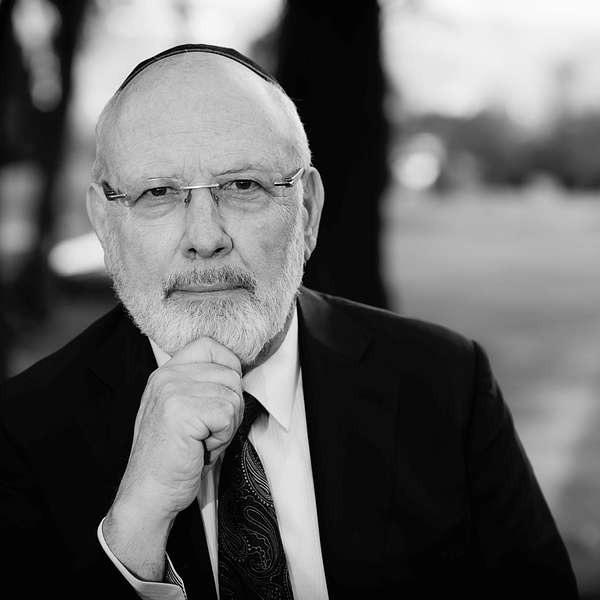
Matmonim: Daf Yomi by Rabbi David Lapin
Matmonim means "hidden treasures." In less than 20 minutes each episode highlights, develops and explains one actionable insight from the Daf Yomi Talmud study cycle. People around the world, from uninitiated seeker to seasoned scholar, are finding inspiration, meaning, and relevance in the wisdom that the Matmonim exposes from every page of Talmud. Matmonim will give you skills to deepen your own learning to get greater satisfaction from the effort you are investing. The podcast is given as a live class each morning at the Raanana Kollel in Israel and focuses on the Daf of the day.
Episodes
1119 episodes
Menachot 40a Wisdom and Knowledge - אם אתה יכול לקיים את שניהם מוטב
For knowledge one needs a good mind; for wisdom one needs a pure soul. Our actions purify or contaminate our souls. This is the meaning of yir’at cheit – fear of sin.
•
21:11

Menachot 37b Cover Your Biceps & Reveal Your Thinking - לך לאות ולא לאחרים לאות
Counter intuitively we learn that it is our thoughts that should manifest themselves to others, while our actions should be hidden.
•
20:53

Menachot 36b How Distraction Eradicates Wisdom - חייב אדם למשמש בתפילון בכל שעה
Forgetting something, being unable to recall it, does not mean the information is eradicated from our minds. But certain distractions can eradicate even profound wisdom from our minds.
•
20:21

Menachot 35b The Inextricable Bond - קשר של תפילין
The uniqueness of the relationship between the Jewish People and their G-d lies in the absolute and reciprocal unconditionality of their bond.
•
23:57

Menachot 33a Gateways - הלך אחר היכר ציר
There is a difference between an entrance and a gateway. It is a gate that can be closed that creates a private domain, not an entrance that is always open.
•
19:48

Menachot 32b People of the Book – מיטה שס_ת מונח עליה
Our relationship to sefarim is not merely an intellectual one, but a sensual one as well.Source Sheet
•
19:34

Menachot 31b Graphic Design and Kedusha - כגובה שמים על הארץ
Kedusha – a bi-directional flow of Divine energy between Heaven and Earth.Source Sheet
•
20:31

Menachot 30a The Spoken & Written Word - הקבה אומר ומשה כותב
What we say springs from deep within us. What we write could be similarly authentic, or it could be palguarized or copied from elsewhere. We need to be clear in our thought and communications whether we are expressing our own, authentic, deepes...
•
18:59

Menachot 27a Familiarity Breeds Contempt – ואל יבוא בכל עת אל הקודש
Awe opens deep spiritual pathways that enable wonder. Familiarity closes these pathways. The moment of entrance is when all the drama happens.
•
23:02

Menachot 26a Offering Product or Self – נטמאו שיריה - פסולה
Giving one’s produce away to someone in need or to a higher purpose is initself an offering of life force just as throwing the blood is in the case of a zevach, an animal offering.
•
21:34

Menachot 25a Owning Our Thoughts - נטמא הקומץ, הציץ מכפר
The Tzitz can effect change in the status of an object, but cannot correct the thoughts of a person.Source Sheet<...
•
19:00

Menachot 24a Connected or Joined - כלי מצרף תנן
When two things (or individuals, or communities) are connected, each retains their own separate identity. Their chommer remains separate but together they create a different tzura. When they are joined rather than connected, b...
•
16:57

Menachot 22a - 23b Diversity Strengths & Weaknesses - מין במינו בתר חזותא אזיל
When a Ben Torah looks at sameness and difference, he views it through the lens of conceptual similarity and difference not an empirical one. Conceptual similarity and difference manifests through how each is treated in Halacha.
•
18:00

Menachot 20a Covenant - ברית אמורה במלח
What we do in life is ever-changing and needs to be attuned to circumstance and environment. How we do it is never-changing; it is governed by our covenant with Hashem. The Korban Oleh veYor...
•
19:33

Menachot 18b-19a Offering- שחיטה כשרה בזר
The service of G-d is not about self-sacrifice, it is about elevating one’s life to the higher purpose of the service of Hashem (Korban). Self-sacrifice is just a necessary means to being able to offer one’s life to the service of G-d....
•
19:08

Menachot 17a Misers & Menachot Part 2 – הקומץ את המנחה (ב)
The term Kometz has connotations both of abundance and scarcity.Source Sheet
•
19:17

Menachot 17a Misers & Menachot Part 1 - הקומץ את המנחה (א)
Clarifying the term Mincha and its relationship to the prayer of Mincha. Source Sheet...
•
18:58

Menachot 11a The Lie of The Compromise - היכי קמצי
A compromise between two positions, denies the validity of both. Source Sheet
•
12:14

Menachot 10b Demanding Higher Standards - לא נצרכה אלא לקומץ דמנחת חוטא
Demanding higher standards of a person is a compliment for that individual, not a criticism.Source Sheet
•
16:15

Menachot 6a Sacrifice Punitive or Transformative – שלא יהא קרבנו מהודר
In giving gifts to Hashem our intention is not to change His mind but to transform ours.Source Sheet
•
18:54

Menachot 5a Counting the Days – אין מחוסר זמן לבו ביום
We explore the degree to which units of time – hours, days etc. – are absolute ideas or relative to human experience.
•
18:52

Menachot 4a Suspicion Breaks Connection – מנחת קנאות
Taking steps to prevent people from viewing us with unfounded suspicion is a uniquely human quality. It is not about being sensitive to other people’s opinions of us, it is about building and preserving connection.
•
18:33

Menachot 3b Inconsistency & Falsehood - תורה אחת לכל המנחות
There are two ways to view statements that contradict reality. They could be seen as irrelevant and void, or as blatantly false.
•
13:51
